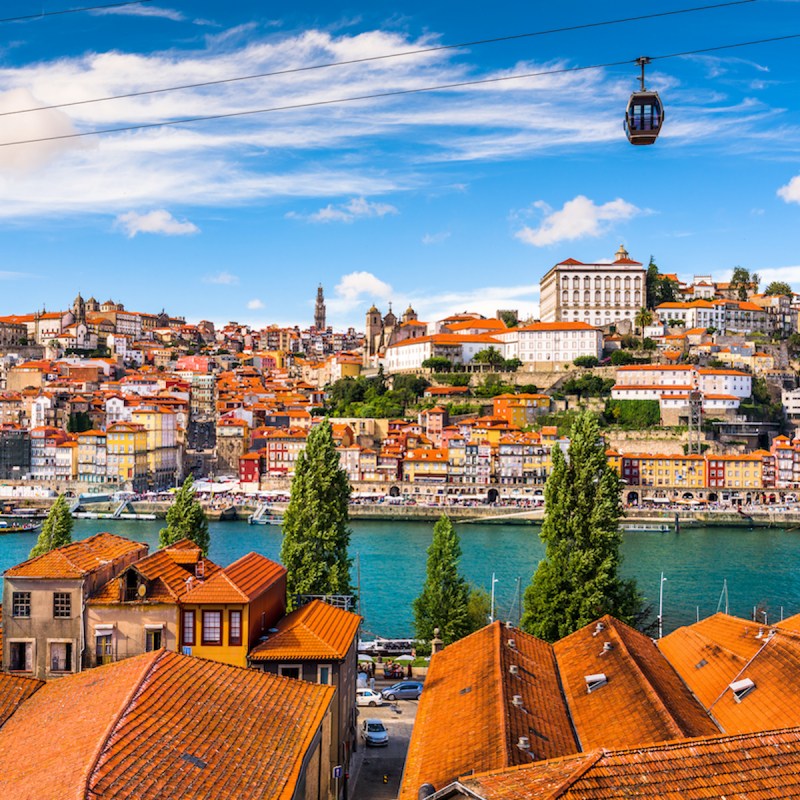
Portugal has many great qualities, and one of its strongest is its incredible public transport network. While many residents choose to get around in their personal vehicles, others rely entirely on the buses and trains that traverse the entire country. With so many transportation options to choose from, it can be a little overwhelming for an American considering retiring in Portugal. Here are six things to know about transportation in Portugal as you consider retiring abroad.
Videos by TravelAwaits

1. Portugal Has An Incredible Train System
Portugal’s expansive train system serves more than 100 million passengers every year. The train serves just about every corner of the country, but the most frequent connections run between big cities.
The state-owned train operator, Comboios de Portugal, offers four major types of connections:

- Urban trains are aimed toward the daily commuter, serving Lisbon, Porto, and surrounding areas
- Regional and InterRegional trains are a local service that stops at every station outside of the Lisbon and Porto suburban areas
- Intercity trains, known as intercidades, are a fast, inexpensive long-distance service that connects the whole country. These routes offer long-distance, inexpensive connections
- Alfa Pendular is the fastest and most expensive service, offering direct routes between all the major cities and covering the entire country, from north to south
With the Comboios de Portugal mobile app, booking tickets and checking schedules is as easy as can be. Trains are a great method of transportation for both short-distance and long-distance travel, with some routes going so far as to connect residents to surrounding European countries.

2. The Bus System Is Simple, Inexpensive, And Quick
Sometimes, trains aren’t the best option for a commuter. When it comes to shorter, inner-city travel needs or unconventional travel times, buses can be the better option.
Bus service in Portugal is a modern, comfortable mode of transportation. Although there are several different companies, all buses are clean, air-conditioned, and equipped with Wi-Fi, sometimes even offering food and drink services.
Residents can easily book both short inner-city rides and long-distance routes through bus companies such as Carris and Rede Expressos, which offer high-class, high-speed service between major cities.
Just like the train service, many bus companies have user-friendly apps, making the ticket purchase process quick and easy. Residents can choose to pay per ride, either booking in advance or offering payment upon boarding, or buying day passes. Day passes give the holder unlimited bus travel for 24 to 72 hours, depending on which pass is purchased.

3. Some Cities Have A Metro
While not available in all parts of the country, metro services are also a great transportation option. Currently, Lisbon and Porto are the only cities that offer these services. Transportation by metro is a quick, efficient way to move around these cities, carrying daily commuters and out-of-town tourists with similar ease.
Tickets are inexpensive, with a one-way trip in Lisbon costing only 1.5 euros, just under $2 USD. As with the buses, residents can choose to pay per ride or purchase a 24-hour pass, which costs around $7 USD.

4. Taxis Are Great For Inner City Travel
If a resident is simply traveling from one part of a city to the other, sometimes taxis are the easiest mode of transportation. Taxis are common in Portugal’s big cities, particularly Lisbon and Porto. They are a great resource when there are no direct bus routes to a desired destination.
As in the United States, most Portuguese taxis have meters that charge per mile. On the rare instance a resident finds themself in an un-metered taxi, the driver and passenger should mutually agree to an amount prior to departure.

5. Personal Vehicles Are Always An Option
Despite the incredible investment Portugal has made in its public transportation system, sometimes residents find it easier to get around the country behind the wheel of their own cars. While a much less common practice than in the United States, the country is perfectly equipped for those who wish to go this route.
Portugal is connected by well-maintained roads, some of which are surrounded by unbeatable views of the countryside. Although there are frequent tolls throughout all of Portugal, the prices are not so expensive as to deter drivers.

6. Domestic Flights Are Fast, Easy Ways To Travel Across The Country
Portugal is a small country, so most cross-country travel is easily accomplished via bus, train, or car. However, short, quick domestic flights can serve as another option for those making a long-distance journey. The country has three international airports as well as several smaller domestic airports. There are frequent flights between the country’s bigger cities, and most cost just under $100.
For more on retirement, check out TravelAwaits‘ editorial here, as well as more Portugal information:
